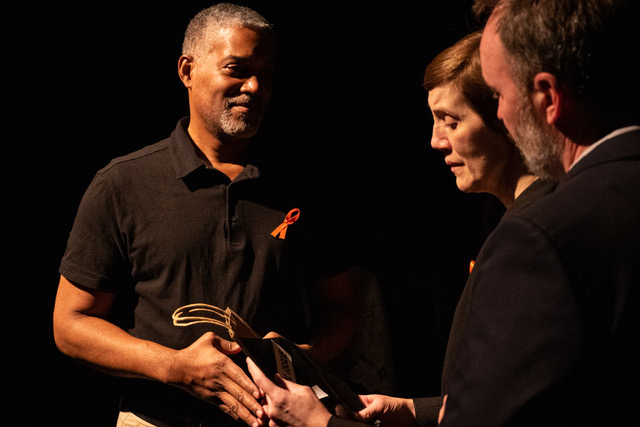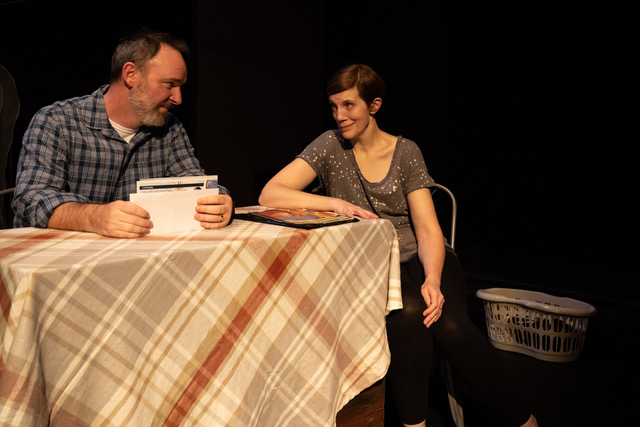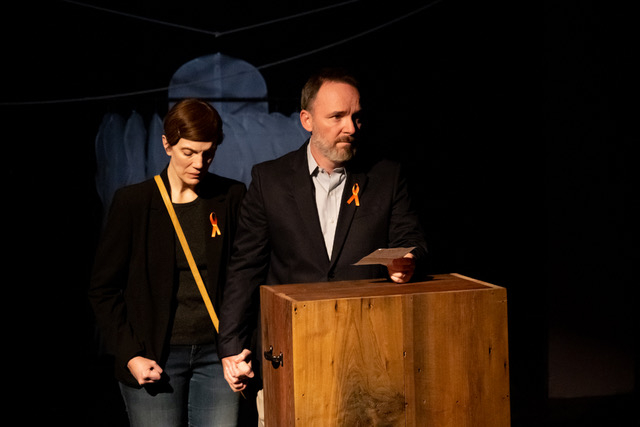
The Magazine
Written by Christie Perfetti Williams
Directed by Matilda Szydagis
The Sargent Theater, 314 West 54th Street, NYC
(through May 13, 2023, tickets available at carnivalgirlsproductions.com/)
This is the era in which mass shootings, particularly at educational venues, are an almost weekly occurrence. The parents of children murdered in these horrific events are, one-way-or-another compelled to move towards coming-to-terms with the unthinkable. I use the phrase "move towards" because, truly, the goal of attaining a semblance of peace on the abrupt loss of a child is often a quest that can accomplish a great deal but may never totally end.
This is a topic I can address -- and judge from my family's own experience. Prior to my birth, my parents had a son, normal and healthy, meticulously cared for by my mother. It was early 1944, when out of the blue, at age six months, my mom noticed him breathing oddly, and called the family doctor. He asked her to hold the phone receiver to the baby's mouth so he could hear his breath, and then directed her to get to a hospital as quickly as possible. The boy had contracted encephalitis. The doctors at the hospital tried to requisition the new medication Penicillin, at that time only available for the military, which they determined would save him. This request, during wartime, was denied. The baby was intubated and died two days later -- and my mother was grief-stricken to the bone, and my two-year old sister stopped eating in response to her mom's intense grief. Doctors instructed that my sister be taken out of her mother's care until the intense grief reached some degree of stabilization. My mother never, ever fully recovered, and a small suit case of the baby's clothing was stored in the family garage, along with a stack of a hundred condolence letters -- items only to be tossed after my mom's death in the late 1990s. Over many years my Mother attained some peace, but the sting of her loss showed up pointedly from time to time. I mention this because it has sensitized me to what was authentic (or not) in such scenarios. The Magazine tells of the experience of a mother and father, portrayed by Lori Funk and Ric Sechrest, when their seventeen-year-old son is killed in a school shooting in an upstate New York community -- and the play begins as they are just starting out on what is sure to be a tortuous extended excursion toward some sense of closure (the kind of closure my mother's loss of a child took many years to reach).

When I first read its plot synopsis, I wondered if The Magazine which dramatizes the couple's ordeal, would be a polemic about gun control (which is being endlessly tossed about in the media right now). Instead I was pleased to be treated to an authentic rendering of what parents endure when confronted with the unthinkable. Playwright Christie Perfetti Williams vividly renders in an at once intimate and direct manner, the untidy permutations of grief and anger, including the kind of comic relief that naturally occurs even in tragedy -- and the unexpected complications that show up in such scenarios. She crafted this into reality with wonderfully naturalistic dialogue delivered by a superb troupe of seasoned actors.
The "magazine," in the title of the play stands for the secrets that are revealed when someone is suddenly removed from the family. In this play this secret is revealed to be multiple subscriptions to tawdry porn magazines which were ordered by the underaged decedent -- the cancellation of which presents humorous (and later poignant) interaction between James Hadlow and an ornery customer service worker at the porn publisher, played with panache by Arlene A. McGruder. The porn magazines comes to the attention of the religious mailman, portrayed by C.K. Allen who gets wind of the unholy contents of the Hadlow's mail and wants to save the recipients from perdition. Both Ms. McGruder and Mr. Allen, may play minor roles, but they have as much of an actor's presence as do Ms. Funk and Mr. Sechrest. This is equally so with the character of a psychic advisor played, by Kristen Vaughan, from whom our mother seeks grief counseling. Their conversations together proceed in such a relaxed and ambling manner giving them a special ring of reality.

The mother's experience of grief and loss initiates introspection regarding alternative paths she could have taken, which might have offered her a life that included the kind of adventure and freedom she experienced in her youth. This comes up during her conversations with Max Hall, with whom she attended high school and had a school girl flirtation. Max, now a widower, has had some success as a musician and comes back to his hometown for a performance. In conversations with him, our mother talks of her travels and admits she'd like to have those kinds of adventures again -- but perhaps she’s resigned to continue in her life where she's ended up.
The structure of The Magazine is played out in a series of short and medium-sized scenes, which jump cut (to use a phrase borrowed from the movies) from one to the next. This structure lacks the direct linear flow of more conventional plays. This manner of exposition, is an enhancement in that it compresses the showing of the process which the parents are undergoing as they begin to venture into the un-chartable territory of loss and grief. Of course this is just their beginning, but at least they aren't drinking nor medicating themselves into a stupor to ease the pain. They are engaged, and that is what matters, that is what is admirable, and even heroic.
Matilda Szydagis' direction rendered the action of the play as utterly natural, with nothing forced, and nothing out-of-kilter as the actors delivered Perfetti Williams' equally naturalistic words. All the players displayed the relaxed precision customary among dedicated professionals. Special kudos go to Lori Funk and Ric Sechrest for performances which anchored the atmosphere of the play, allowing the rest of the cast's acting to flow seamlessly from scene to scene. Funk gave what I consider a tour-de-force performance with a kind of focused presence which compelled me to award her my most acute attention.
Regarding theater -- or entertainment arts at large: I never want to be entertained again, and desire solely to be inspired, to have my sense of humanity and compassion enhanced and empowered. The Magazine is an inspirational play -- both in its writing, direction, and performances. When I/we read of mass shootings at schools, and elsewhere, such a work as The Magazine opens theater goers to possess a larger awareness of the authentic stories that reside beyond the mechanistic renderings of journalistic "human interest".
